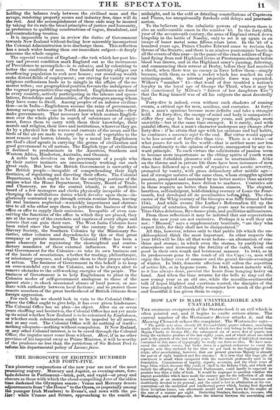• .THE HOROSCOPE OF EIGHTEEN HUNDRED AND FORTY-FIVE.
TER planetary conjunctions of the new year are not of the most mising augury. Mercury and Jupiter, as evening-stars, fore.a debates in Parliament—brisk, pert, and vapid—or prosy and
.4(
obscure as those with which the cloud-compelling Jove of the olden time darkened the Olympian senate: Venus and Mercury denote adjournmenta from "the House" to the Opera, or (especially among the younger Irish Members) to Evans's, and rows with the police while Uranus and Saturn, approaching to the zenith at midnight, and in the cold or drizzling constellations of Capricorn and Pisces, too unequivocally forebode cold delays and procrastination.
To the believers in the cabalistic powers of numbers there is also an unfavourable omen in the number '45. In the forty-fifth, year of the seventeenth century, the arms of England struck down kingship in the battle of Naseby, only to set it up again in an image of baser metal some fifteen years later. In the '45 of a hundred years ago, Prince Charles Edward came to reclaim the throne of the Stuarts; and there is an aimless pantomimic bustle in all the events of this year—in the panic of the crack soldiers of England flying from raw Highland levies at Prestonpans almost before blood was drawn, and in the Highland army's pausing., faltering, and commencing their retreat at Derby, before they had received a check, when there was no enemy in force before them—simply because, with them as with a rocket which has reached its culminating-point, the internal projectile force was expended. Wilkes's "number" 45—that word of fear troubled a nation's loyalty in the loyal age of George the Third, when it may be said. (sanctioned by Milton's "fairest of her daughters Eve ") that the King himself was of all his subjects the most devotedly loyal. Forty-five is indeed, even without such shadows of coming events, a critical age for men, maidens and centuries. At fortyfive, a man's opinions become more definite and take a stronger hold. At forty-live, the energy of mind and body is unimpaired: stiffer they may be than in younger years, and perhaps more unwieldy—but at the same time stronger. It is rarely, and with painful efforts, that a man's character undergoes any change after forty-five : if he attain that age with lax opinions and bad habits, he continues a mouvais stdet to the end. But virtue would appear to be less assured at forty-five than vice. There is a virtue—or what passes for such in the world—that is neither more nor lees. than conformity to the opinion of society, unsupported by any inward principle. To such virtues the solicitations of passion seemto become more importunate as the ebbing spirits of youth warn them that forbidden pleasures will soon be unattainable. Alike on the throne and in private life there have been instances of men who have followed up a youth of repulsive and ascetic severity, prompted by vanity, with gross debauchery after middle age— and of stronger natures of the same class, whom struggles against passion, prompted and sustained by no better motive than anxiety to preserve appearances, have driven to madness. Centuries are in these respects no better than human sinners. The elegant,heartless, self-indulgent, bold-thinking century of Louis the Fourteenth, had developed all its peculiarities beforik1844 The clut,-, racter of the Whig century of the Georges was fuffy formed before 1745. And while events like Luther's Reformation fill up the juvenility of centuries, their closing years may be consumed in Titus Oates delations, Rye-house plots, and guillotine millenniums.
From these reflections it may be inferred that our expectations from the new year are not excessive. Perhaps it is well they are not : "Blessed," says a supplementary beatitude, "are they who expect little, for they shall not be disappointed.'
All this, however, relates only to that public life which the tinphilosophical think the most important. In other respects the year 1845 will be like all that went before—an alternation of sunshine and storms ; in which even the storms, by purifying the atmosphere and increasing the fertility of the earth, work out good in their own rough and boisterous manner. In 1845, as in its predecessors gone to the tomb of all the Capul.ets, men will enjoy the balmy eves of summer and the genial fireside-evenings of winter. In 1845, domestic affection will soften the asperities of active life, as in bygone years. In 1845, honest industry will, as it has always done, prevent the hours from hanging heavy on hand. And when the time returns for the bells to ring out the now young year as an old one, while the maudlin-sentimentaltalk of hopes blighted and exertions wasted, the disciples of the true philosophy will thankfully remember how much of the good and beautiful it has given them to enjoy.






















































 Previous page
Previous page